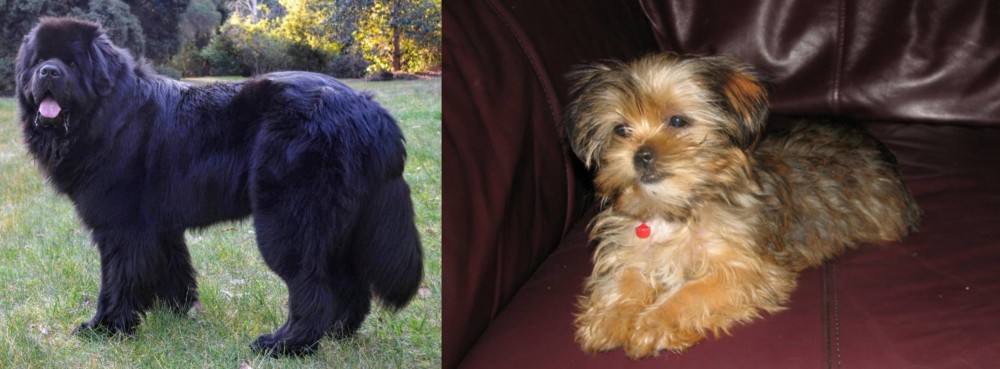 Petzlover
Petzlover Newfoundland Dog is originated from Canada but Shorkie is originated from United States. Newfoundland Dog may grow 50 cm / 20 inches higher than Shorkie. Newfoundland Dog may weigh 73 kg / 161 pounds more than Shorkie. Newfoundland Dog may live 5 years less than Shorkie. Newfoundland Dog may have more litter size than Shorkie. Both Newfoundland Dog and Shorkie requires Moderate Maintenance.
Newfoundland Dog is originated from Canada but Shorkie is originated from United States. Newfoundland Dog may grow 50 cm / 20 inches higher than Shorkie. Newfoundland Dog may weigh 73 kg / 161 pounds more than Shorkie. Newfoundland Dog may live 5 years less than Shorkie. Newfoundland Dog may have more litter size than Shorkie. Both Newfoundland Dog and Shorkie requires Moderate Maintenance.
 The Newfoundland dog is a large working dog. They were bred and used as a working dog for fishermen in the Dominion of Newfoundland, an eastern province of Canada. With their web feet they were also used for water rescue.
The Newfoundland dog is a large working dog. They were bred and used as a working dog for fishermen in the Dominion of Newfoundland, an eastern province of Canada. With their web feet they were also used for water rescue.
The history of the Newfoundland Dog is unsure, but the breed as we know it today originated from dogs which were brought from Newfoundland to England in the early 1800's.
The Newfoundland Club was founded in 1886 so as to promote the breed.
 The Shorkie is a mix between a Yorkshire Terrier and a Shih Tzu. This little dog actually thinks he’s quite big. He is a great watchdog and a barker, and he is a loyal and loving member of his family. He will let you know if he thinks something is going on that shouldn’t be.
The Shorkie is a mix between a Yorkshire Terrier and a Shih Tzu. This little dog actually thinks he’s quite big. He is a great watchdog and a barker, and he is a loyal and loving member of his family. He will let you know if he thinks something is going on that shouldn’t be.
This hybrid combines two breeds known for their good looks, cuteness and personalities. Shorkies get their watchdog instincts and their loyalty to their people from the Shih Tzu and their personalities and good looks from the Yorkie. This designer breed has no known standard and every puppy is different, but traits from its founding breeds will remain. Both breeds have great personalities.
Regardless of the differences within the litter, because the personalities and adorableness of the two founding breeds are equal, all of the puppies will have those characteristics. They will all be energetic, playful and think they are big dogs. They will all love people and especially kids – playing and watching over them.
The Shorkie is intelligent, trainable, and snuggly. They will also have the stubborn trait that the two founding breeds can show at times. Developed in the United States, this crossbreed is extremely popular even though they have been in existence for only ten years or so. Breeders in the U.S. began to mix these two breeds in order to develop a cute, friendly and intelligent little dog that will cuddle on your lap – perfect lap dog.
Even if we already have breeds similar to the Shorkie, its development allows breeders to diversify and improve the genetics of the dogs. It is important that these be responsible breeders whose intentions are not financial but to legitimately improve the positive traits of each breed while sorting out the undesirable or weak traits. This is the positive side of the new designer breeds.
Even though it is still being developed, at least the Shorkie seems to be a success story for designer breeds as a loving, popular little dog. It will take a lot more time and a lot more development before the Shorkie becomes an actual recognized breed. At the moment it remains a hybrid, a crossbreed, a so called designer dog.
It will be at least 7-10 generations of careful and quality breeding before the Shorkies are potentially recognized as its own pedigree breed. It is important to breed Shorkies to Shorkies in order to develop a standard that could be accepted for a new breed by the AKC and UKC. Over time the puppies must become more and more standardized in their conformity to that new breed standard. Their physical appearance and their temperament will be standardized. At this stage the second generation of Shorkies is rare. Their popularity is rising in the United Kingdom. Both Britain and Ireland have a growing interest in this hybrid.
 The Newfoundland is a large dog standing at between 63cm to 74cm, both male and female. Weight can vary from 45kg to 80kg.
The Newfoundland is a large dog standing at between 63cm to 74cm, both male and female. Weight can vary from 45kg to 80kg.
He has a double coat of medium-length straight hair and the hair can be black, brown or gray. Although it is common for the Newfoundland to have a solid-colored coats, you will sometimes find small patches of white on their chest, toes, or at the tip of the tail. Then again you get the less common Newfoundlands where the coat is white with some black markings and these are known as Landseers.
The outer coat is coarse, oily and water-resistant quality, suited to a dog that loves to spend time in the water. The head is broad and large with small ears that he keeps lying close to his head. The tail is long and plumed and the feet are wide with webbing between the toes which aids him with swimming.
As with many large dogs, the Newfoundland is docile and his sheer size makes it that he is best suited to life in the countryside as opposed to living in the city. This is also because this particular dog wants to be close to water where he can swim.
He is a trustworthy, loyal dog and will get on well with children and pets in the home. Training and socialization is always recommended for any dog, but a big dog can often ‘get in the way’ indoors and you want him to lie down or sit when you tell him to. He is an intelligent dog so will respond well to training.
 The Shorkie, being a cross between the Yorkshire Terrier and the Shih Tzu, and as such has physical and temperament characteristics from both breeds. They could be 50-50 but most likely each puppy will be more like one of the founding parents than the other. Because there is a lot of similarity between the founding breeds there is a lot of similarity between the Shorkies.
The Shorkie, being a cross between the Yorkshire Terrier and the Shih Tzu, and as such has physical and temperament characteristics from both breeds. They could be 50-50 but most likely each puppy will be more like one of the founding parents than the other. Because there is a lot of similarity between the founding breeds there is a lot of similarity between the Shorkies.
Their hair is either wavy or straight, but it is soft. It can be a wide variety of colors and usually they have a darker mask on the face. Usually they have the eyes of the Shih Tzu – large -but not protruding. Their muzzle is short, and the skull is round with triangle ears. Their bodies are compact, small with plenty of muscle for their size. They also have fine bones and short legs, with a thin curled tail.
 Your beautiful, cuddly puppy will soon become a giant dog with a big appetite. Don’t just buy a cute puppy if you can’t afford to feed him properly and you can’t give him lots of attention.
Your beautiful, cuddly puppy will soon become a giant dog with a big appetite. Don’t just buy a cute puppy if you can’t afford to feed him properly and you can’t give him lots of attention.
Your dog will also be shedding, so be aware of these aspects before you bring a large Newfoundland into your home. He is a gentle dog, but his size could be worrisome if he isn’t trained, socialized and supervised.
Newfoundlands are amicable dogs, and while he may like to spend times indoors with you relaxing, he is a working dog and will require exercise and activities for mind and body.
Give this giant of a dog a loving home, and you will have a special, devoted friend like no other.
 The Newfoundland can be prone to serious health conditions such as hip dysplasia and gastric torsion. Deep chested dog breeds like the New Foundland are susceptible to bloat, a life threatening condition where the stomach swells, it can twist and the dog can die if help isn’t available. He will be salivating, restless and whining while also trying to vomit.
The Newfoundland can be prone to serious health conditions such as hip dysplasia and gastric torsion. Deep chested dog breeds like the New Foundland are susceptible to bloat, a life threatening condition where the stomach swells, it can twist and the dog can die if help isn’t available. He will be salivating, restless and whining while also trying to vomit.
Giant breeds are also prone to elbow and hip dysplasia, a genetic problem which can ultimately affect your dog’s mobility.
When in any doubt about your pet’s health, get him to the vet.
 Many hybrids are in better health at least genetically than their parent breeds. Responsible breeders will breed any genetic issues out of their puppies. Still there are many health issues that the Shorkies are prone to. These include:
Many hybrids are in better health at least genetically than their parent breeds. Responsible breeders will breed any genetic issues out of their puppies. Still there are many health issues that the Shorkies are prone to. These include:
• Brachycephalic Airway Syndrome – “smashed face” causes problems with breathing, heat, flying and more.
• Glaucoma – Yorkshires have this, and it can be secondary to the lens Luxation.
 Your dog’s coat will need to be brushed at least twice a week as he is a heavy shedder.
Your dog’s coat will need to be brushed at least twice a week as he is a heavy shedder.
Do the nails of your dog as soon as they start getting long. Long nails can hook on things and cause injury to the dog’s paw area.
This is a dog with floppy ears so check inside the ears to prevent ear infections, more so because this is a water-loving dog. The dampness inside the ears can cause bacteria.
This is a giant breed and sadly, they have the shortest lifespans. You want to make sure that you keep your giant breed as healthy as possible to ensure he reaches the 10 or so years allotted to him and to also prevent health problems.
Make sure your giant breed puppy and adult has the very highest quality commercially manufactured food to ensure he gets the right balance of nutrients in. This food also makes sure that your puppy rather grows at a slower rate and stronger as opposed to growing too quickly. Rapid growth comes with joint problems.
All dogs, large and small, don’t want exotic, strange food that upsets their stomachs. They want consistency and simplicity and they want tasty food. Give him some homemade food such as cooked chicken, brown rice or pasta and some vegetables such as sweet potato, carrots and spinach. You can add this occasionally to his dry kibble.
Add in some raw meat from time to time too. Your pet will be strong, healthy, happy and content.
 1.Feeding the puppy - The Shorkies need a high-quality, well-balanced dry kibble. Make sure it is a formula for small, active dogs. It should have lean meat and essential minerals and vitamins. Make sure it is puppy food not adult. The puppy needs 300 -550 calories a day in 3 meals.
1.Feeding the puppy - The Shorkies need a high-quality, well-balanced dry kibble. Make sure it is a formula for small, active dogs. It should have lean meat and essential minerals and vitamins. Make sure it is puppy food not adult. The puppy needs 300 -550 calories a day in 3 meals.
2.Feeding the adult – Obesity is a problem for the Shorkie as it is for many small dogs. Don’t overfeed your adult but give her the same kind of high quality small breed dog food, only for adults. They need about 200-300 calories a day in 2 meals.
4. Games and Exercises – These are very active little dogs and need exercise every day. They needs walks, games, and time with you. They also love to cuddle with you at the end of the day. They love squeaky toys and playing fetch outside or inside.